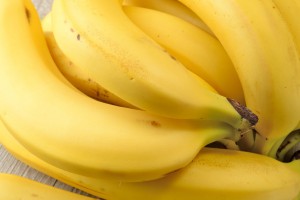This S*** is Bananas…or Not

Bananas, the fruit Ray Comfort once described as the “atheists’ nightmare” (because they’re made by God to fit perfectly into the human hand), seem to now be facing God’s wrath—or, more realistically, a fungal disease that threatens to wipe out Banana Girl’s only source of food.
The curved yellow priapic shape we associate with “banana” is actually the result of eight to nine thousand years of domestication. Humans selectively bred the bananas in order to create the Cavendish variety—the cultivar commonly seen in North American grocery stores today. The Cavendish is described as less sweet and less flavorful than the Gros Michel, aka “Big Mike,” which is a cultivated variety that was virtually wiped out from commercial growing and exporting by the Panama disease in the 1950s.
The banana has very little defense against such biological attacks because it is a monoculture crop—there is no genetic diversity. Because the Cavendish is actually a mix of three banana species of the genus Musa and is seedless, each plant is genetically identical. When the disease infects one plant, it is difficult to contain and can easily wipe out an entire crop, rendering the fields virtually unusable for years to come.
Today, Tropical Race 4 (TR4), a strain similar to Panama disease, threatens to wipe out the Cavendish, as well as other locally grown varieties. Scientists believe the disease started in Malaysia, a hub of banana diversity, where it proved capable of attacking many species, including the Cavendish. Only one in eight species is immune. TR4 is quickly spreading across continents, impoverishing local economies (banana exports are an $8.9 billion industry) and the farmers reliant on their crop. It’s also devastating those regions where bananas are a necessary staple, not a fad. Experts suggest that if the disease reaches Central America (home to eighty-two percent of the global banana supply), the Cavendish as we know it will no longer brighten our grocery store fruit aisles.
Large banana exporters such as Dole and Chiquita are turning to traditional selective breeding techniques in a race against the clock. They hope to develop a cultivar that is just as portable as the Cavendish but immune to TR4—though they’re afraid to turn to genetic modification because of the public disdain for genetically modified organisms (GMOs).
Yet it’s unclear how genetic modification, which is simply a more sophisticated application of biotechnology than selective breeding, is worse, unless you couch it within traditional distinctions between what is artificial and what is natural. People also tend to perceive higher levels of uncertainty and risk in GMOs, as if the unstudied long-term effects of ingesting GMOs are of a more severe risk than those of selective breeding.
However, there are a couple of scientists working on a genetically modified TR4-resistant banana. James Dale, professor at Queensland University of Technology in Australia, is one of few scientists funded privately and publicly to work on Cavendish modification efforts, and has already developed new insights. As Dale reported in the New Yorker in 2011, there’s evidence that the TR4 fungus doesn’t inject toxins that kill cells, but instead programs cell death: “Instead, they switch on a certain mechanism in the plant and the plant actually kills itself.” This reimagining of the mechanism by which the fungus operates has allowed Dale to come up with innovative solutions to test. Rather than trying to insert an antifungal gene, he is working on inserting a gene that “tells the plant not to kill its own cells.”
Others, like food writer Michael Pollan, suggest that all biotechniques support monoculture, allowing “the old paradigm to survive.” But reduced crop genetic diversity is a fact of industrial-scale agriculture that will require complex designs to resolve, and it is not necessarily encouraged by GMO advancements. Rather than shy away from biotech solutions, we should aim to use the most advanced science we’ve got if we don’t want 1923’s novelty hit “Yes! We Have No Bananas” to describe reality. And we should be working on solutions and ways to diversify banana exports in the same way we do our apples.
And who knows, perhaps we can convince Kirk Cameron to revert to atheism for real upon discovering the imperfections of the gift that is a banana, wrapped in a nonslip, biodegradable wrapper.
